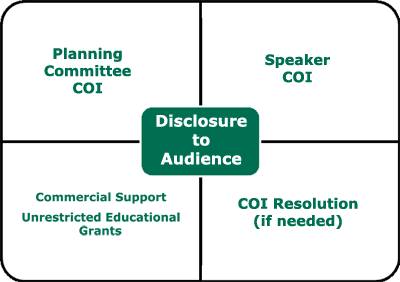
In compliance with the Conflict of Interest Policy, all disclosure information gathered during the planning of an event must be communicated to the audience prior to the activity. Disclosure has four elements:
- Planning Committee COI
- Speaker COI
- Commercial Support Unrestricted Education Grants
- COI Resolution (if needed)
During the initial stages of the planning process, planning committee members must disclose any relevant financial relationships that might affect independent involvement in the proposed CME activity. Planning committee members who refuse to disclose financial relationships must be disqualified from participating in planning the activity.
At least two weeks prior to the activity, invited speakers must disclose any relevant financial relationships that might affect independent involvement in the proposed CME activity. Any speaker who refuses to disclose financial relationships will be disqualified from participating in the implementation of the activity.
During the above phases, if any individual declares a potential conflict of interest, the conflict of interest resolution process must be completed by that individual, reviewed by the planning committee, and approved by the director of CME.
All of the above must be communicated to the audience regardless of the status of information. This means even if no individual disclosed a relevant financial relationship, that information must be communicated to the audience.
In addition to the above, all commercial support in the form of educational grants must be communicated to the audience.
Communication of the above may be made in many forms, including verbally (requires a verbal disclosure form, Disclosure and Bias Handout (DOC), Verbal Disclosure Script (DOC), or other proof of disclosure), through activity materials, on the brochure, or in any other documentable way. Evidence of disclosure must be turned into the CME office two weeks after the event.
